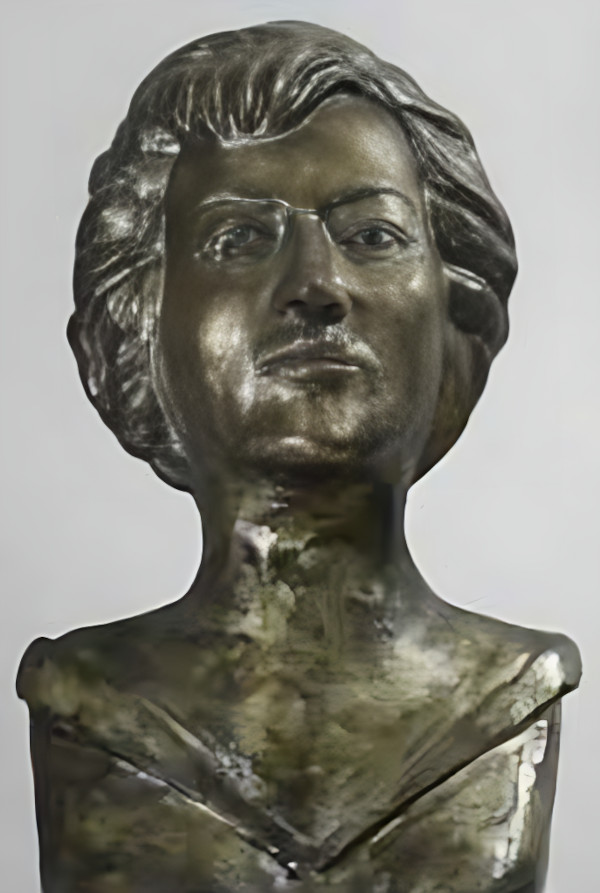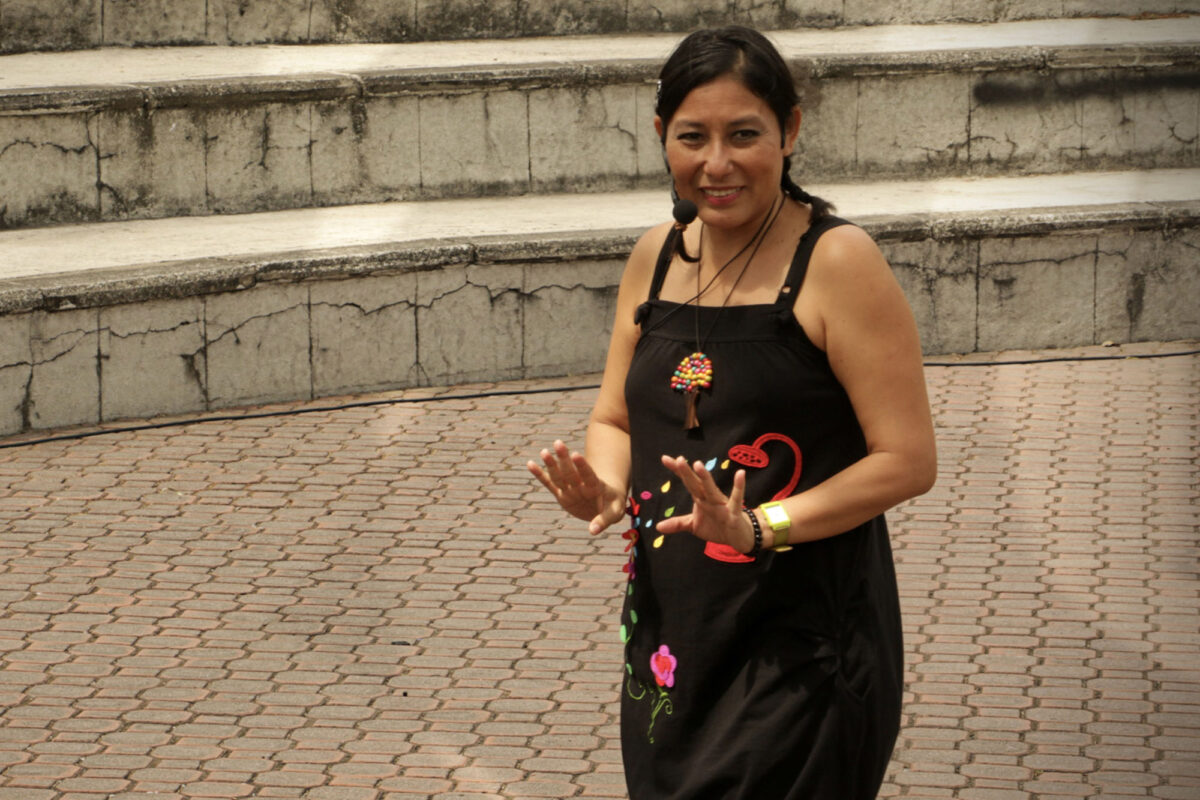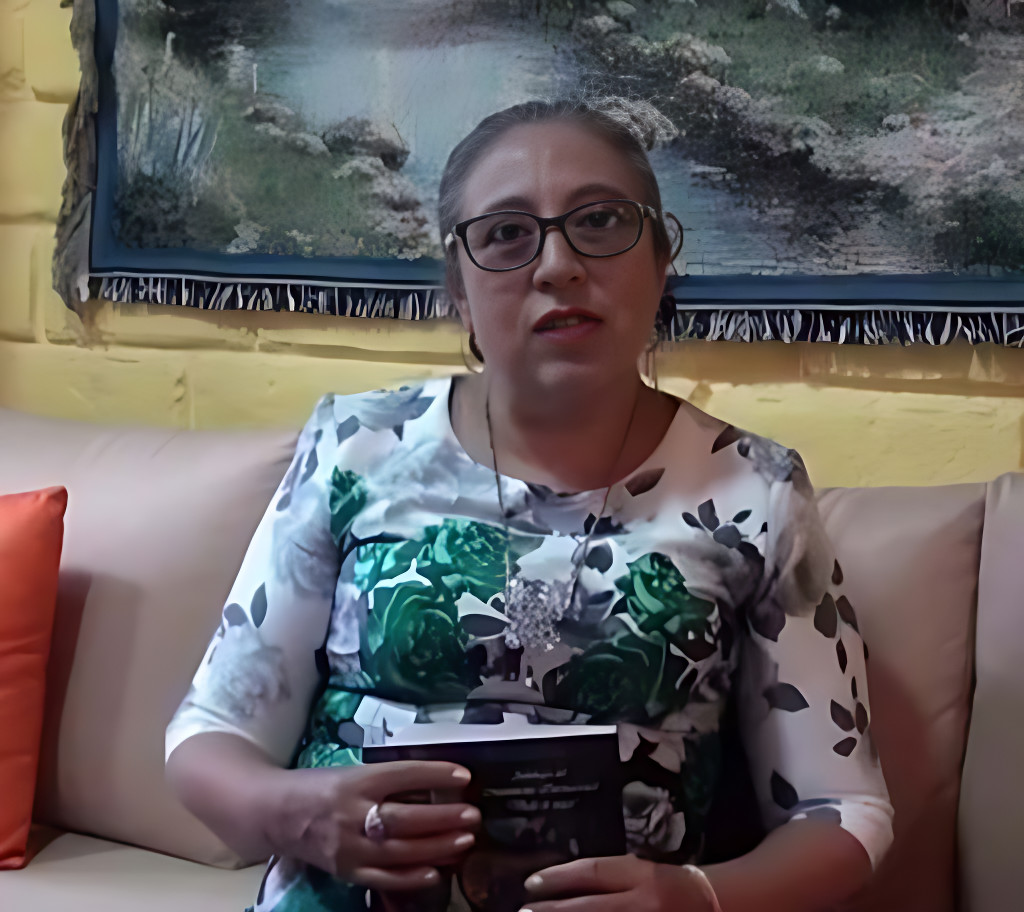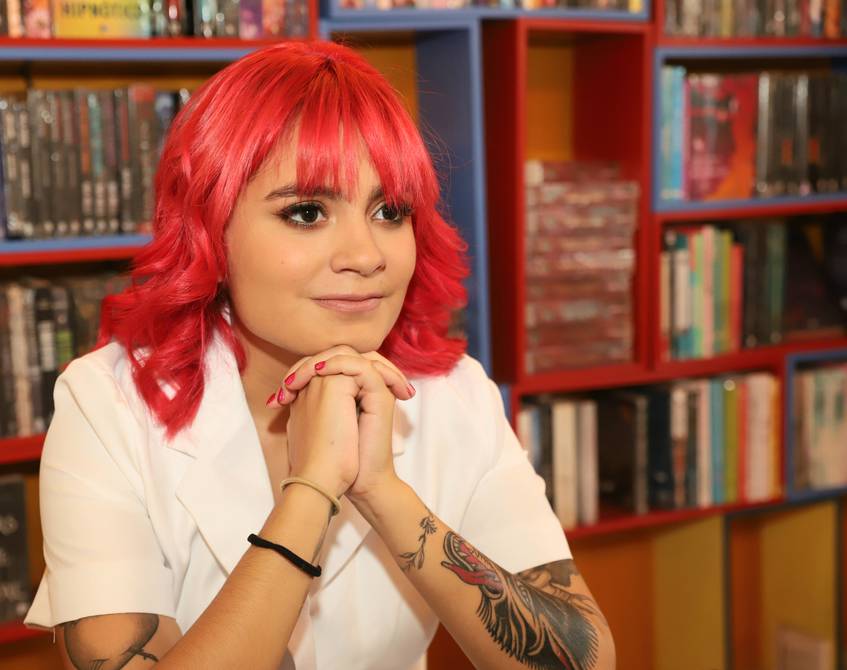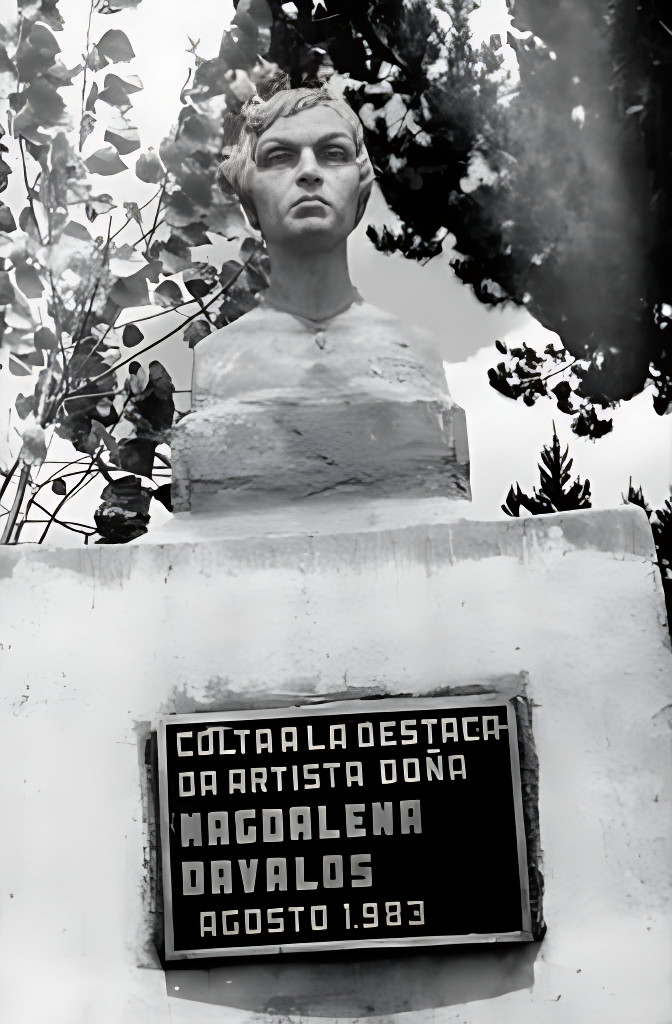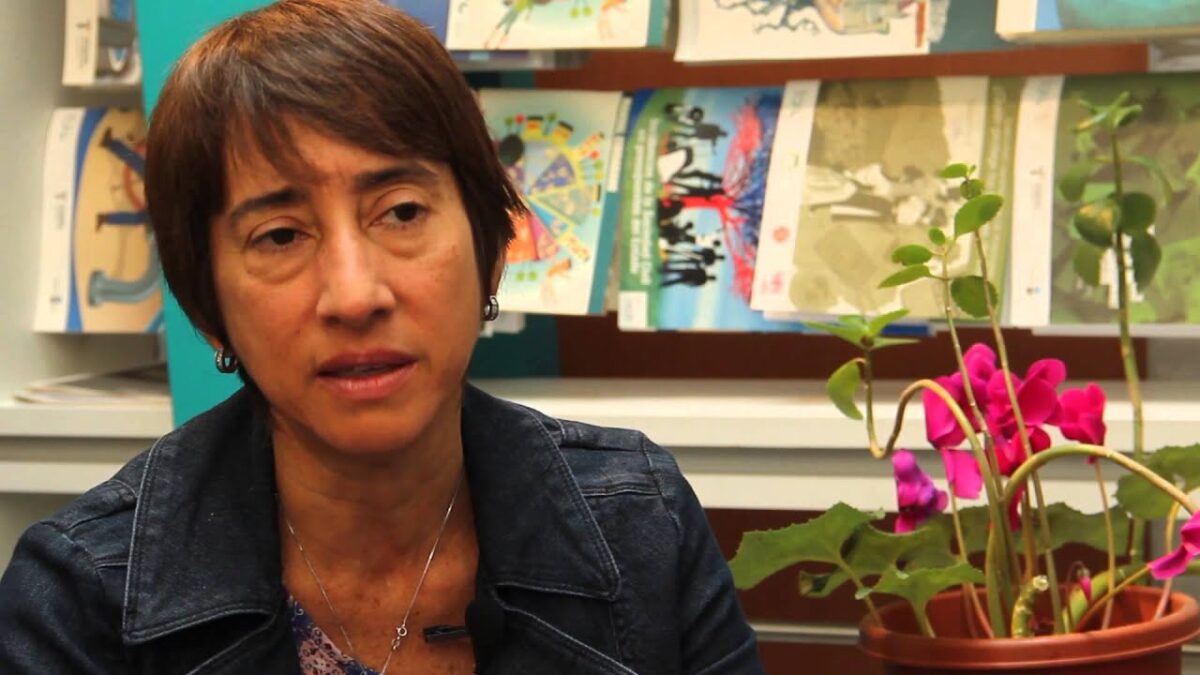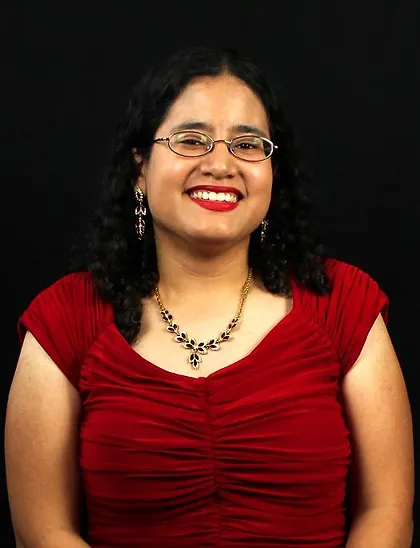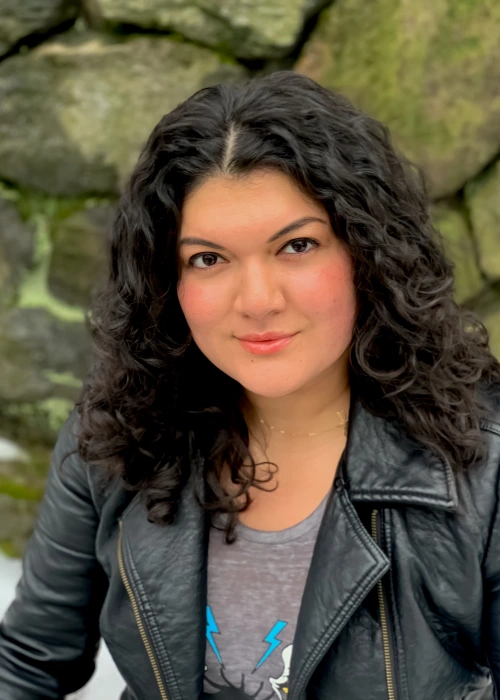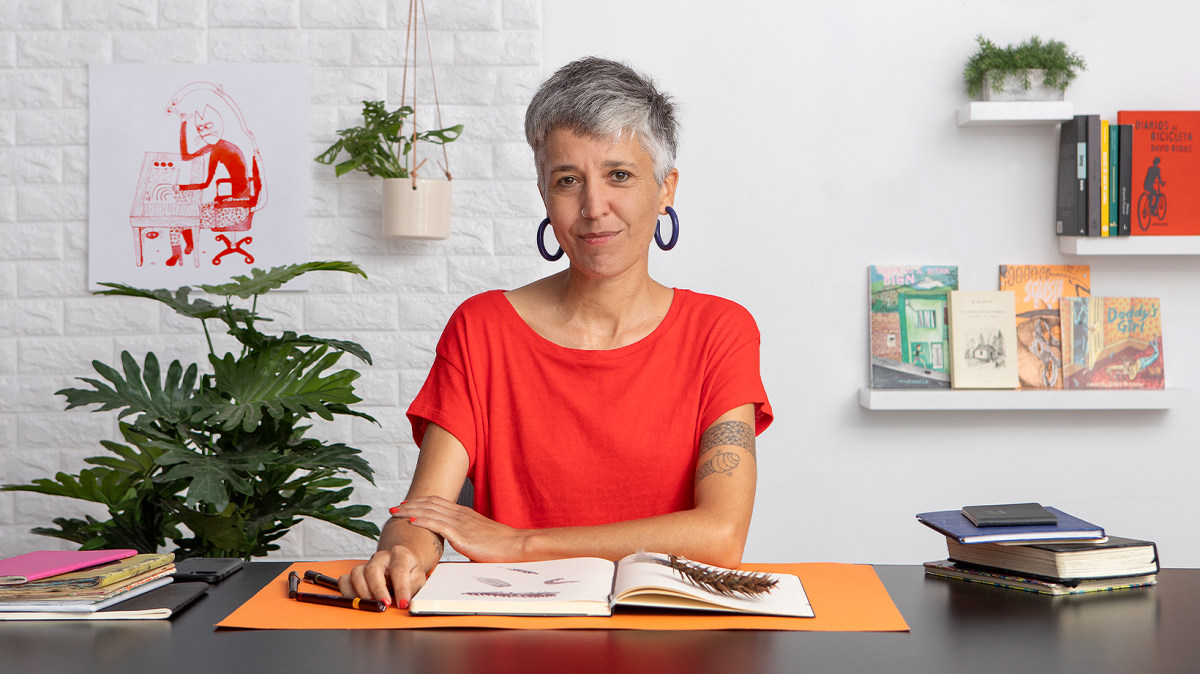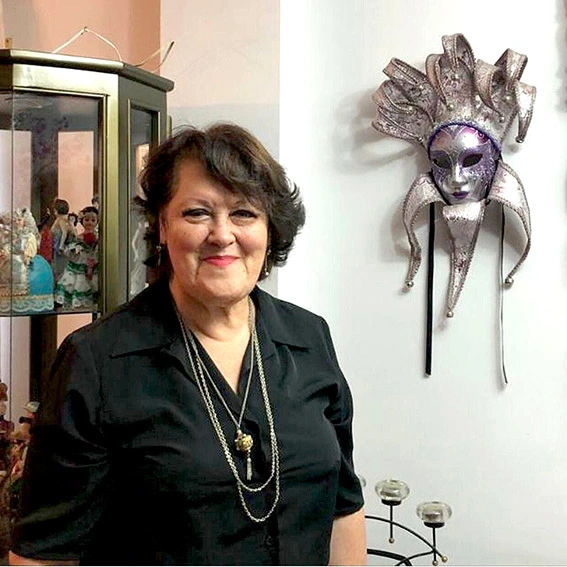Zoila María Castro (1907-2001) was a prominent Ecuadorian writer who, alongside Mary Corylé, Eugenia Viteri, and Carmen Acevedo Vega, stands as one of the most significant female figures in Ecuadorian literature from 1948 to 1960. Her most important work, titled “Urbe,” is a book of short stories that offers a social realist perspective on Ecuadorian immigrants in the U.S. Among her notable works are “En el norte está el dorado” and “Verónica, historia de amor.”
Continue reading “Zoila María Castro”Category: Female writers
Ángela Arboleda
Ángela Arboleda Jiménez (Guayaquil, 1969) is a journalist, publicist, dancer, oral storyteller, writer, cultural manager, and teacher. Her literary career began under the mentorship of Miguel Donoso Pareja, and she has published works such as “Cuentos y tradiciones orales del Ecuador” (2006), “Nadie sabe qué hará mañana” (2008), “Tuétano” (2021), and “Esa mujer es la muerte” (2022). A dedicated preserver of oral traditions, Arboleda has toured festivals for over 20 years, and her significant contributions to cultural management are marked by her leadership in various storytelling events. She has been recognized with nominations for Woman of the Year in Art and Culture. She holds advanced degrees in Cultural Management and teaches at the University of the Arts (UArtes) in Guayaquil.
Continue reading “Ángela Arboleda”Gladys Paredes Bonilla
Gladys Erminia Paredes Bonilla (Riobamba, 1965) is an Ecuadorian poet and educator. She is a member of the literary section of the Chimborazo chapter of the House of Ecuadorian Culture. She represented Ecuador at the 2020 “Second Virtual Book Fair Italy.” Bonilla is part of the “Vuelo de Mujer” movement, a group of 45 women using poetry to combat violence against women and promote respect. Her 2018 poetry collection “Instantes,” was published by the Chimborazo branch of the House of Ecuadorian Culture.
Continue reading “Gladys Paredes Bonilla”Roxana Landivar
Roxana Landívar (Guayaquil, 1997) is an Ecuadorian poet. Landívar’s poignant poems, characterized by their evocative imagery and exploration of human themes, have garnered wide acclaim. They have been published not only in her collections “Ciudades cemento” (2019) and “Fractura primaria” (2020) but also in distinguished magazines and anthologies across Ecuador, Peru, Mexico, Argentina, Brazil, and the United States. With her participation in various festivals and international book fairs, Landívar continues to enrich the Latin American literary sphere, reaching out to a broader audience, and shaping conversations around contemporary poetry.
Continue reading “Roxana Landivar”Paola Cando
Paola Cando Bermeo (Cuenca, January 25, 1995) is an Ecuadorian writer and poet. Her journey in literature began in 2012 when she published “Parchís,” a collection of several young authors from the city of Cuenca. Two years later, she was part of the poetic anthology “Nuevas Voces de la Poesía Cuencana,” presented at the XII Encounter on Ecuadorian Literature by the State University of Cuenca. In 2015, along with numerous Latin American authors, she was featured in the poetic anthology “90 revoluciones,” published by the independent publisher Mecánica Giratoria. 2017 saw her collaborate with the independent publisher Ninacuro Cartonera on another poetic anthology titled “Cirugía inflamable.” In 2020, her poem “Chendoaventuras” was selected to be featured in the book “Poemas sobre dos ciudades.” This book compiled the winning entries from the Azogues and Cuenca 2020 Poetry Prize Competition, as well as additional poems from the same competition, chosen by the jury.
Continue reading “Paola Cando”Sara Arana
Sara Arana, known as “La abogada del rap,” is a 25-year-old rapper, poet, and activist hailing from Guayaquil, Ecuador. Despite facing numerous challenges, including addiction and the tragic loss of her mother, she found solace and strength in the arts. Through her powerful and heartfelt music, poetry, and culinary talents, she has become a voice for empowerment and social change. Arana’s debut poetry book, “HipHop es vida” (2021), serves as a testament to her resilience and a celebration of the genre that has shaped her life. Arana’s experiences and personal journey showcase the transformative power of art and serve as an inspiration to others.
Continue reading “Sara Arana”Renatta Villamar
Renatta Villamar (Guayaquil, December 8, 2000) is an Ecuadorian poet. The youngest daughter of the former mayor of Guayaquil, Cynthia Viteri, Villamar has embarked on a unique journey of self-expression and exploration through literature and art. Born into a high-profile political family, Villamar defied traditional expectations and chose to chart her own path in life. An emerging writer and illustrator, she first gained recognition with her debut poetry collection, “Una flor en la tormenta” (“A Flower in the Storm”), first presented in the Guayaquil International Book Fair in 2021. Aged just 20 at the time of publication, Villamar’s work draws on personal experiences and emotions, reflecting her battles with mental health conditions, including depression and anxiety, and serves as a testament to her resilience. Her decision to work as a waitress, while simultaneously honing her craft as a writer, speaks to her humility and commitment to personal growth. As she continues her journey as an artist, Villamar has made appearances at international literary events, such as the Bogotá International Book Fair in 2022, further establishing her presence in the literary world.
Continue reading “Renatta Villamar”Magdalena Dávalos y Maldonado
Magdalena Dávalos y Maldonado (Chambo or Colta, 1725 – Guano, January 8, 1806) was an Ecuadorian scholar, literary figure, and talented artist in both painting and music, active during Ecuador’s Spanish colonial era. Her notable accomplishments are underscored by her distinction as the sole female member of the Escuela de la Concordia, also known as the Patriotic Society of the Friends of the Country of Quito (Sociedad Patriótica de Amigos del País de Quito). This influential literary society, founded by Eugenio Espejo, played a pivotal role in promoting Enlightenment thought and nurturing nationalistic sentiments in Spanish South America. Magdalena’s inclusion in this esteemed society highlights her exceptional intellect, education, and literary prowess, defying prevailing gender norms and leaving an enduring impact on Ecuador’s intellectual and cultural landscape. Today, her legacy is honored in Riobamba, where the city has dedicated one of its most significant schools and a small street in her memory, acknowledging her profound contributions to the arts and intellectual development of the region.
Continue reading “Magdalena Dávalos y Maldonado”Carolina Portaluppi
Carolina Portaluppi Castro (Guayaquil, 1963) is an Ecuadorian poet, economist, and educator. Her literary journey began with the publication of her first poetry collection, “Excluidos los signos,” in 1999, which delves into a range of human emotions and experiences. In 2009, she unveiled her second book, “Dice que no sabe,” which draws inspiration from the renowned Argentine poet Alejandra Pizarnik and showcases Portaluppi Castro’s introspective writing style. Carolina Portaluppi Castro holds the position of Coordinator of the Master’s Degree Program in Public Administration at Casa Grande University where she is also a professor of Public Policies. Additionally, she serves as a Professor of Public Policies for Disaster Risk Reduction at the Universidad Andina Simón Bolívar. Her poems have been published in various anthologies, including, “Indignados tus hijos del yugo,” “La voz del Eros,” and “Poetas de la Mitad del Mundo.”
Continue reading “Carolina Portaluppi”Eulalia Barrera B.
Eulalia Barrera B., born Eulalia Beatriz Barrera Barrera (Quito, 1918 – Unknown) was an Ecuadorian writer and journalist who, along with her sister Inés, made a significant contribution to Ecuadorian literature. The Barrera sisters not only penned numerous “tradiciones” and short stories but also compiled important anthologies showcasing the works of other Ecuadorian writers. Notable among these are “Tradiciones y leyendas del Ecuador” (El Comercio, 1947) and “Los mejores cuentos ecuatorianos” (El Comercio, 1948). Eulalia Barrera’s distinctive approach to the “tradiciones” genre, integrating a gender analysis, set her work apart. Her stories, particularly “Flor de amor” and “La Capilla del Consuelo,” scrutinize the subordinate roles of women in society, shedding light on themes of oppression, loyalty, and solitude. Many of her works remain uncollected.
Continue reading “Eulalia Barrera B.”Ikah Gabriela Loayza
Ikah Gabriela Loayza (Quito, Ecuador, 1988) is an Ecuadorian writer and scriptwriter, known for her contributions to various forms of media. She holds degrees in Journalism and a Master’s in Fiction Scriptwriting. Loayza has collaborated with several national production companies as a scriptwriter, writer, and translator for projects spanning fiction, documentaries, and advertising. Her teaching experience includes courses in creative writing and scriptwriting at various institutions. She also co-wrote the web series “Kronos: guardianes del tiempo” and contributes to the YouTube channel “La Fábrica del Ocio,” where she offers literary advice. A well-rounded creative, Loayza has spent time studying at the University of Wisconsin-Richland and the Pontifical University of Salamanca. Her latest book, “El beso de la sirena vampiro,” showcases her talent in the young adult fantasy genre and was published in 2019 by Eskeletra Editorial.
Continue reading “Ikah Gabriela Loayza”Darlene P. Campos
Darlene P. Campos is an American author born in Houston, Texas to an Ecuadorian family. Her published young adult novels include “Behind Mount Rushmore” (2017), “Summer Camp is Cancelled” (2018), and “Heaven Isn’t Me” (2019). She has garnered numerous accolades for her writing, such as the Sylvan N. Karchmer Fiction Award at the University of Houston in 2013 for “The Bullet” and the Dastaan Fiction Award in 2017 for “Mason Jars.” Darlene holds a BA in English-Creative Writing with a minor in Medicine and Society Studies from the University of Houston, and an MFA in Creative Writing from the University of Texas at El Paso.
Continue reading “Darlene P. Campos”Zoraida Córdova
Zoraida Córdova (Guayaquil, 1987) is an Ecuadorian-American author of fantasy novels for children and young adults, as well as romance novels. Born in Guayaquil, Ecuador, she immigrated to the United States at a young age, embracing English as her second language. Growing up in Hollis, Queens, Córdova’s passion for writing was ignited by the works of authors like Amelia Atwater Rhodes. She dedicated herself to refining her skills, attending writing camps and conferences throughout her college years. Her notable achievements include the Brooklyn Brujas series, an exploration of identity, family, and magic. The series, which won her an International Latino Book Award for its first installment, stands as a testament to her storytelling prowess. In addition to her acclaimed series, Córdova has made significant contributions to the Star Wars canon universe, including her novel “Star Wars: Convergence (The High Republic).” Furthermore, she displays her versatility by writing romance novels under the pen name Zoey Castile, notably the popular Happy Endings series.
Continue reading “Zoraida Córdova”Power Paola
Power Paola, pseudonym of Paola Andrea Gaviria Silguero (Quito, June 20, 1977) is a Colombian-Ecuadorian comic artist and author of graphic novels. Among her most noteworthy works is the 2011 graphic novel “Virus Tropical,” which has been widely praised. It was later translated into both English and French by Random House / Mondadori. Paola also contributed to the adaptation of this novel into an animated film in 2017, which subsequently won the 2019 Quirino Award for Best Ibero-American Animation Feature Film. Paola’s other notable works include “Por Dentro” (2012), “Diario” (2013), “qp” (2014), “Todo Va a Estar Bien” (2015), and “Nos vamos” (2016). Power Paola’s body of work deals with diverse themes including sexuality, feminism, family dynamics, and personal identity. She’s a member of a comics collective called Chicks on Comics.
Continue reading “Power Paola”Susana Álvarez
Susana Álvarez, born Martha Susana Álvarez Galarza (Ambato, 1949) is an Ecuadorian writer, poet, educator, and cultural activist. Throughout her career, she has made significant contributions to literature, particularly in the field of poetry and cultural preservation. Some of her notable poetry books include “Memorial de los días,” “Celosía del Alba,” and “Fiorella de Agua.” In addition to poetry, she has written essays such as “Ellos son y Están aquí…. Encuentros” and “Mujeres bajo el cielo de Loja. La investidura de La Mujer del Siglo XXI.” Álvarez’ dedication to preserving Ecuadorian cultural heritage is evident in her books “Antología de la leyenda ecuatoriana” and “Loja y sus leyendas,” which delve into the country’s rich folklore and legends. Recognized for her literary achievements, she has received prestigious awards, including the “Juan León Mera” decoration and the Illustrious Ecuadorian Woman Award in 2015. Recently, she received the prestigious “Matilde Hidalgo Navarro” decoration at the 2023 Women’s Art Encounter. This recognition, bestowed by the House of Ecuadorian Culture in Loja, acknowledges her outstanding cultural contributions in both Loja and Ecuador.
Continue reading “Susana Álvarez”
